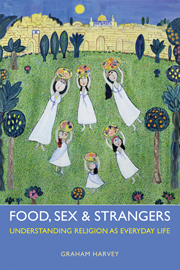Book contents
- Frontmatter
- Dedication
- Contents
- Preface
- 1 Of god and goats
- 2 Religioning elsewhere
- 3 Christianity is not a religion
- 4 Talking like a pirate
- 5 Real world
- 6 Doing violence with impunity
- 7 Respecting relations
- 8 Things full of meaning
- 9 Purity and pilgrimages
- 10 Enchantment and emplacement
- 11 Christians do religion like other people
- 12 Religion is etiquette in the real world
- Bubliography
- Index
3 - Christianity is not a religion
- Frontmatter
- Dedication
- Contents
- Preface
- 1 Of god and goats
- 2 Religioning elsewhere
- 3 Christianity is not a religion
- 4 Talking like a pirate
- 5 Real world
- 6 Doing violence with impunity
- 7 Respecting relations
- 8 Things full of meaning
- 9 Purity and pilgrimages
- 10 Enchantment and emplacement
- 11 Christians do religion like other people
- 12 Religion is etiquette in the real world
- Bubliography
- Index
Summary
Some Christians and scholars who study religion claim that Christianity is defined by and as “belief in god”. No other religion is properly defined in terms of beliefs or believing. This means that either Christianity is the only religion, or it is not a religion at all. This is hardly a new thought but I put it more starkly here than I have seen it put before. It is a commonplace of the study of religion that belief and believing are not at the heart of religion (though they may be at the heart of Christianity). If so, belief and believing should not be permitted to direct our attention when we research and teach about religions. This chapter sets the scene for thinking again about what “religion” might mean by reflecting on this recognition that believing is a definitive act for Christians but has been wrongly applied to defining religion itself.
It may be important to note, in passing, that by saying that Christianity is not a religion I do not mean that Christianity is not a human creation. I do not mean that it is something different from some sort of social or cultural phenomenon. I most certainly do not mean that Christianity is (uniquely or otherwise) a divinely revealed truth. Some Christians make this pious assertion of the exceptionalism of Christianity, insisting that “religion” is “man-made” (where they do not think it is a satanic counterfeit) and quite different from (their kind of) Christianity.
- Type
- Chapter
- Information
- Food, Sex and StrangersUnderstanding Religion as Everyday Life, pp. 43 - 58Publisher: Acumen PublishingPrint publication year: 2013



